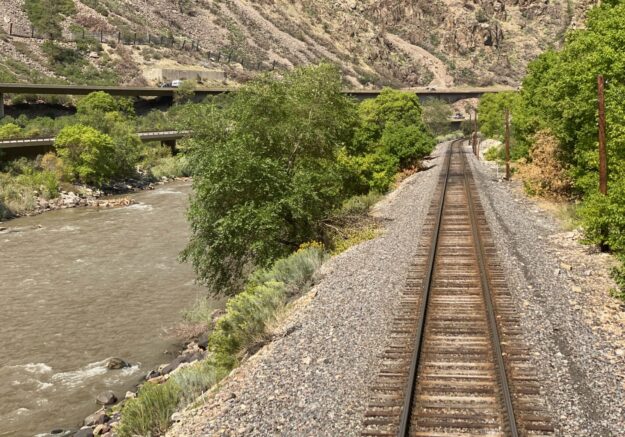Widgetized Section
Go to Admin » Appearance » Widgets » and move Gabfire Widget: Social into that MastheadOverlay zone
Colorado lawmakers cite Ohio spill in formal attempt to block federal support for Utah oil trains

U.S. Sen. Michael Bennet and U.S. Rep. Joe Neguse of Colorado on Monday wrote a letter to U.S. Agriculture Secretary Tom Vilsack urging him to formally suspend federal authorization of a Utah rail project that will send up to five, two-mile-long oil trains a day along the Colorado River, under the Continental Divide at Winter Park, and through downtown Denver.
Citing “ongoing concerns about the risks to Colorado’s communities, water, land, air, and climate from the Uinta Basin Railway Project,” Bennet and Neguse noted the U.S. Forest Service, part of the Department of Agriculture, has yet to issue a special use authorization for construction of the 88-mile railway that would run through the Ashley National Forest in Utah and connect the oil fields in the northeastern part of that state to the nation’s main rail network.
“We urge you to formally suspend any decision on that authorization until a supplemental review is conducted to fully evaluate the effects of this project on Colorado’s local communities and environment,” the Bennet-Neguse letter states. “This review is especially critical in light of the recent train derailment and environmental disaster in East Palestine, Ohio, which has laid bare the threat of moving hazardous materials by rail.”
A Norfolk Southern freight train derailed on Feb. 3 in East Palestine, leading to the toxic release of vinyl chloride.
The Forest Service last July approved the Utah project but still must issue a special use permit, and the U.S. Surface Transportation Board, which oversees the nation’s railroads, gave the Utah project the nod more than a year ago despite a dissenting vote from STB Chairman Martin Oberman. It’s estimated the new railway will enable up to 4.6 billion gallons of waxy crude oil a year to travel Colorado’s Central Corridor rail line on its way to Gulf Coast refineries.
“These trains would run for over 100 miles directly alongside the headwaters of the Colorado River — a vital water supply for nearly 40 million Americans, 30 tribal nations, millions of acres of agricultural land, and a main driver of our state’s recreation and tourism economies,” the letter states. “The river is already in crisis, unable to provide the water needed to meet demand.”
Bennet and Neguse, both Democrats, write in their letter that the Forest Service’s own “flawed” projections predict at least one oil spill derailment every four years in Colorado, with heated oil tanker cars likely to spark wildfires in remote canyons, leading to further mudslides like the ones that have plagued Glenwood Canyon — frequently shutting down Interstate 70.
Neguse’s 2nd Congressional District, which stretches from Eagle County in the west to the northern Front Range in the east, has seen some of the state’s largest wildfires, including the Grizzly Creek fire in Glenwood Canyon in 2020.

“Folks in my district — in communities along the proposed railway — are deeply concerned about this project, and I share their concerns,” Neguse told Colorado Newsline. “The recent toxic train derailment in East Palestine, Ohio, serves as yet another reminder of the potential damage these freight trains can cause. That is precisely why Sen. Bennet and I are calling on Secretary Vilsack to suspend any decision authorizing the construction of the Uinta Basin Railway until a full evaluation can be completed. For the wellbeing of Coloradans and everyone involved, we must adequately account for all possible consequences before moving forward in any manner.”
Bennet in an email to Colorado Newsline criticized environmental reviews to this point.

“The environmental reviews conducted thus far have been deeply flawed. Especially in light of what happened in Ohio, the federal government should be focused on a thorough evaluation of the risks of derailment,” Bennet told Colorado Newsline. “A derailment of this train could ignite a wildfire or severely contaminate the Colorado River, which is already in crisis. The absolute last thing the federal government should do is finance this project with taxpayer money.”
A public good?
As first reported by the Colorado Sun, the Seven County Infrastructure Coalition in eastern Utah last month approved the Uinta Basin Railway seeking up to $2 billion in tax-exempt private activity bonds allocated by the U.S. Department of Transportation in order to fund the now nearly $3 billion rail spur being built exclusively for oil shipments. Those bonds in the past have funded public benefits such as Front Range highway improvements and passenger rail in Florida.
Allocation of PABs to fund an oil rail spur, critics say, would be unprecedented.
“I have to presume there’s something in there that (the tax-exempt funding) has to be for a public good,” said Eagle County Commissioner Matt Scherr, whose county is suing to stop the Uinta Basin Railway on environmental grounds. “And, for right now, under the Biden administration anyway, pulling more oil out of the ground and shipping it 2,000 miles for processing does not represent a public good.”
Scherr added a “told you so” when asked about the Ohio chemical spill, which has ignited a national debate over rail safety in recent weeks, and expressed his disagreement with Grand County commissioners who recently questioned the value of Eagle County’s legal challenge. Aerial view of the train derailment wreckage in East Palestine. (Screenshot from NTSB B-roll recorded Feb. 5, 2023)
Representatives of Utah’s Seven County Infrastructure Coalition and the Uinta Basin Railway did not return emails and social media messages seeking comment on the Bennet-Neguse letter and Bennet’s separate opposition to using tax-exempt PABs to fund the oil rail project.
“This is a pretty momentous occasion to approve a resolution for a project this big,” coalition chairman Casey Hopes said after the Feb. 9 vote at the Utah Capitol. “And I appreciate all the work that’s gone in on the back end from so many in the room … We’re looking forward to the day when we get to ride the first train out of the Uinta Basin.”
U.S. Sen. Mitt Romney of Utah also is a fan of the project, stating Feb. 16 on Twitter: “The Uinta Basin Railway will be key to the region’s economic future. Met with Duchesne County Commissioner Greg Todd and County Recorder & (Utah Association of Counties) President Shelly Brennan for an update on the railway project. Grateful for their efforts to foster further economic development.” Romney is joined by fellow Utah Republican Sen. Mike Lee in backing the project, which would send up to 350,000 barrels of oil a day through Colorado.
Vilsack last summer declined to discuss the Uinta Basin Railway: “You know, this is currently in litigation. Folks are raising questions about the Surface Transportation Board’s decision, and it’s probably inappropriate for me to comment too much about this.”
Hazardous materials would quadruple
The active Central Corridor line through Grand Junction and Glenwood Canyon cuts through the northwestern corner of Eagle County and follows the Colorado River into Grand County, where it then travels through the Continental Divide at the state-owned Moffat Tunnel at Winter Park.
“While the State Legislature does not have any legal jurisdiction over this decision, as an Eagle County resident myself and a legislator who represents thousands of constituents that could be impacted by these impending decisions across multiple counties in my district, I am terribly concerned,” state Sen. Dylan Roberts of Avon said in an email. “In a time where our water is more precious than ever, it seems completely contrary to common sense to risk contamination of the headwaters of the Colorado River in order to transport more fossil fuels in a hazardous and expensive way.”
Roberts said he’s working with Western Slope colleagues on a letter to federal representatives, the U.S. Department of Transportation and others to express those concerns in the coming week. Scherr confirmed Eagle County will be a party to that letter.
Part of Eagle County’s legal challenge is the fear that the dramatic increase in trains carrying hazardous materials through the Denver area will put pressure on Union Pacific to reopen its long-dormant (but not abandoned) Tennessee Pass Line, which connects to the Central Corridor at Dotsero and travels along the Eagle and Arkansas rivers to Pueblo.
“I personally strongly call on those in the power to make these decisions to rethink (the Uinta Basin) proposal and to take the use of Tennessee Pass off the table in light of the East Palestine disaster and the acute water crisis Colorado and the West currently faces,” Roberts added.
The Denver Office of Transportation and Infrastructure recently produced a report predicting that the number of rail cars with hazardous materials traveling through Denver would quadruple over the next three to four years, largely due to the Uinta Basin Railway.
“I am deeply concerned about rail safety in Colorado, and in Denver in particular, since it is a rail hub in a heavily populated area,” Denver mayoral candidate and state Sen. Chris Hansen, a Democrat, told Colorado Newsline in a text. Hansen has been a champion of renewable energy in the Legislature. “The tragic accidents in Ohio reinforce the urgency to improve safety rules, and I will be looking at state and local options and advocate for improved federal rules.”
Ted Zukoski, an attorney with the Center for Biological Diversity — an environmental group also suing to stop the Uinta Basin Railway — questioned the federal government helping to fund an oil freight project by covering 70% of the project with tax-exempt bonds.
“If you look at the list of projects that have been funded that have gotten the DOT’s approval to issue tax-exempt bonds, they are projects that benefit the general public — mass transit projects, bridge repair projects,” Zukoski said. “Anybody can use those projects and they’re a benefit to the general public. But this is a rail line that is projected to carry one product out of the basin, which is oil. So this would be a huge taxpayer subsidy to the oil industry at a time when we should be weaning ourselves off oil to combat the climate crisis.”
Zukoski points to one of President Joe Biden’s first acts in office in January 2021 when he signed an executive action on climate change: “This president announced a policy on Day One in his office of combating the climate crisis. And it is incompatible with combating the climate crisis to be shoveling money to a single purpose oil railroad.”
The East Palestine derailment and chemical spill has prompted bipartisan railroad safety reform efforts in Congress in the form of the Railway Safety Act as cleanup crews take drastic actions to mitigate the impacts of the ongoing disaster. Despite record profits, the nation’s four Class 1 freight railroads have slashed staffing and, critics say, cut corners on safety measures.
Editor’s note: This story first appeared on Colorado Newsline, which is part of States Newsroom, a network of news bureaus supported by grants and a coalition of donors as a 501c(3) public charity. Colorado Newsline maintains editorial independence. Contact Editor Quentin Young for questions: info@coloradonewsline.com. Follow Colorado Newsline on Facebook and Twitter.
David O. Williams
Latest posts by David O. Williams (see all)
- In governor’s primary race, Bennet, Weiser sparring over who is tougher on Trump - July 15, 2025
- The O. Zone: Battle for public lands just now heating up, much like our atmosphere - July 14, 2025
- Immigrant rights groups push Colorado AG Weiser for probes into violations of ICE collaboration law - July 11, 2025


